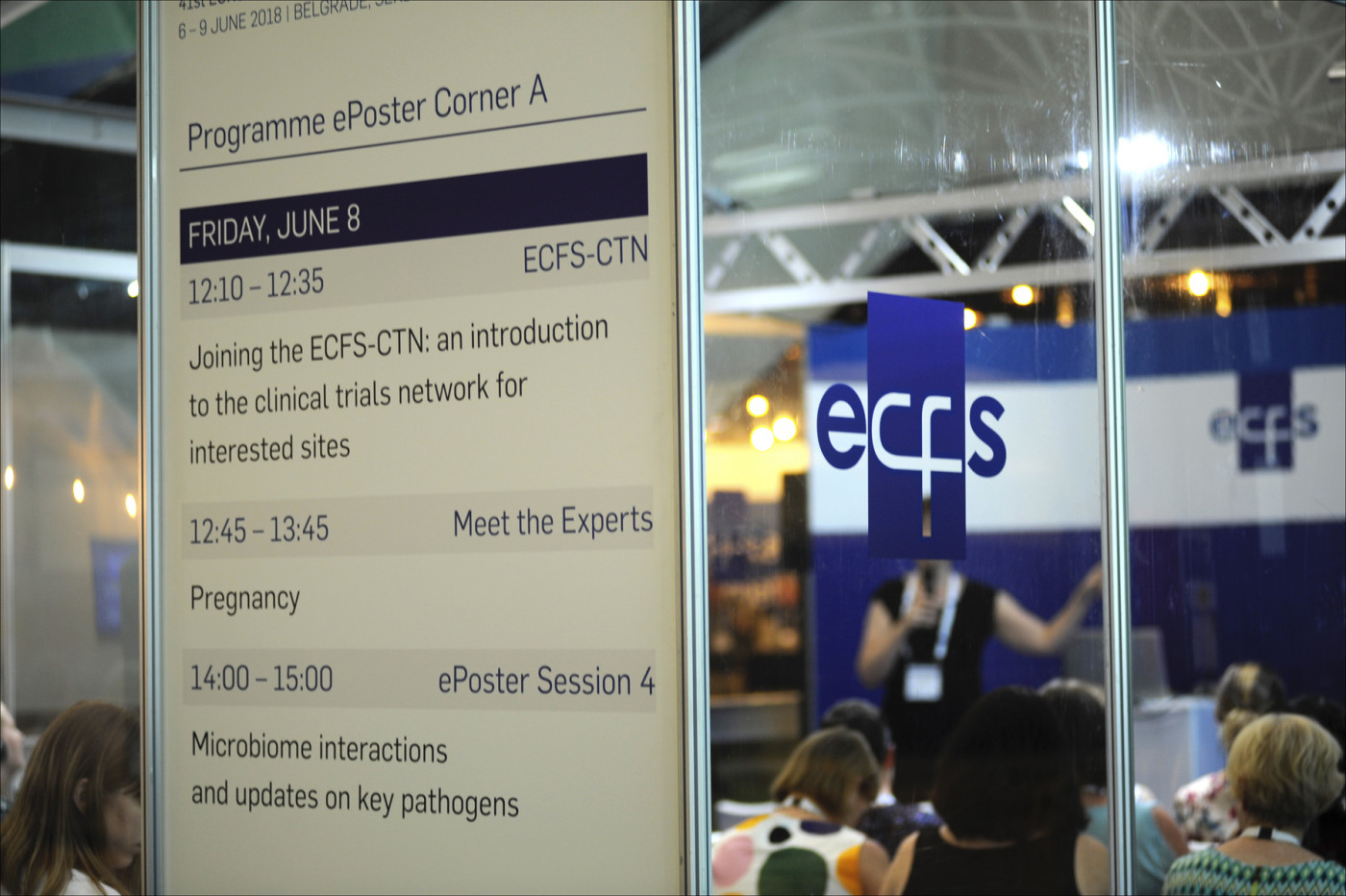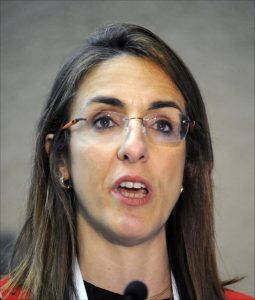#ECFS2018 – With CF Patients Living Longer, Fertility and Childbirth Concerns Take Center Stage
Written by |

Poster sessions are publicized at ECFS 2018 in Belgrade, Serbia. (Photos by Larry Luxner)
Cystic fibrosis (CF), once an exclusively pediatric disease, is clearly one no longer. Of the 32,000 or so Europeans registered with CF, nearly half are more than 18 years old, and babies born with the illness today can expect to live into their 50s and 60s.
This means issues like pregnancy and reproductive health have taken on added urgency as more and more CF patients start families of their own.
“When a patient would tell me she wanted to have kids, I used to think they better hurry up and do it at a young age if they wanted to enjoy their children while they were still alive,” said Hannah Blau, MD, director of the Pulmonary Institute at Israel’s Schneider Children’s Medical Center.
“That scene has really changed dramatically, so our counseling has to change in parallel with that,” she said. “With today’s life expectancy in CF, it’s now a realistic option to have a family, and preconception planning is crucial.”
Blau was one of four CF experts to speak at a June 7 symposium, “Fertility and reproductive challenges in cystic fibrosis,” that took place earlier this month at the 41st European Cystic Fibrosis Conference (ECFS) in Belgrade, Serbia.
Some 35 percent of women with CF are infertile or subfertile, compared to between 5 and 15 percent of women in the general population, according to Malena Cohen-Cymberknoh, MD, a pediatric pulmonologist at Hadassah Medical Center in Jerusalem. She said the first pregnancy in a woman with CF was reported in 1960; the baby was born prematurely and died six weeks later.
“Counseling begins little by little, as your patient grows up,” Blau said. “One day, they bring their partner to meet you, and they say they’d like to have a baby. But planning the baby, the risk to mother and fetus, collaborating with the obstetrician, how they’re going to bring up the baby — all these issues should be discussed pre-conception.”
Pregnancy often means difficult choices
Blau recalled one patient, a 31-year-old woman who taught sports at a high school. She was pancreatic insufficient, with FEV1 (forced expiratory volume in 1 second, a measure of lung function) at 66 percent. In addition, her husband was a carrier of F508del CFTR, the most common CF genetic mutation.
“We discussed with her the different options: no children, adoption, in vitro fertilization [IVF] with pre-implantation diagnosis; or accept the 50 percent chance of a child with CF and do CVS [chorionic villus sampling] at nine weeks, with the decision to abort if CF,” she said. “We discussed this at length, and she chose option E — spontaneous pregnancy. She didn’t want to have IVF.”
The woman conceived and at nine weeks she did the CVS and it came back positive.
“She decided straight out that she wanted to have an abortion, and despite extensive support from our CF team and our psychologist, she became very depressed,” Blau said. “A few years later, she now very much wants to have a child. Her pulmonary status remains fairly unstable, with FEV1 at 54 percent.”
But this time she chose a surrogate pregnancy, a decision Blau supported because of the decline in her lung status.
Another patient who wanted a baby was a 28-year-old psychologist whose husband was not a carrier of mutations in the CFTR gene. Her FEV1 was 65 percent, she weighed only 36 kilograms (79 lbs.), her height was just 140 cm (4’7”), and her body mass index was a dangerously low (18.4).
“She insisted, so we went along with her, but in the second trimester, she did not gain any weight despite all our efforts, and I was afraid for her life,” Blau said. “Anytime she tried to increase her intake, she would start vomiting, so she agreed to a nasogastric tube and continuous night feeds. She gained 3 kilos [7 lbs.] but at 33 weeks, she had a pulmonary exacerbation, FEV1 dropped to 60 percent, she developed jaundice and autoimmune hemolytic anemia.”
Eventually, with the help of steroids, iron supplements and a blood transfusion, the woman gave birth at 34 weeks “to a healthy lovely girl” weighing 2.4 kg (5 lbs.).
For her second child, two years later, she “went for a surrogate mother,” Blau said.
Surrogacy sometimes best option
“The key to success here is interactive communication with the patient, with the partner, sometimes with the family, and interdisciplinary teamwork — because every pregnancy in CF is unpredictable,” Blau said.
Between 20 and 50 percent of women with CF have difficulty conceiving, she said, due to tenacious cervical mucus, loss of ferning, fallopian tube obstruction, and decreased ovulation.
“Most women with CF planning children become pregnant spontaneously. But if a CF patient wants IVF, it’s important to aim for a single pregnancy and avoid a twin pregnancy if possible, because of the increased challenges of managing CF,” she said.
Also of paramount importance is managing nutrition, since pregnant women with CF need an extra 300 calories a day. The goal is for at least 11 kg (24 lbs.) of weight gain during pregnancy.
“Think about the guilt and anxiety mothers feel when they’re sick and cannot look after their children. They need to pool personal resources with their partner and take support from all those who are willing to give it,” she said, adding that “couples have said that having a child gives them additional motivation to keep their CF stable.”
Male infertility and CF
Men with CF have their own issues; 97 to 99 percent of them are infertile due to obstructive azoospermia (absence of spermatozoa in the ejaculate due to problems with sperm delivery), according to Susan Madge, PhD, a British CF specialist at London’s Royal Brompton Hospital.
Madge said that 71 percent of 42 adult male CF patients who responded to a 2004 questionnaire were aware of this fact, yet half did not recall having discussed fertility issues with their doctors.
In addition, 71 percent of the men surveyed wished to have children, but 45 percent were unaware of available methods — and of those who had heard of such alternative methods of reproduction as IVF or intracytoplasmic sperm injection (ICSI), only a few fully understood what those terms meant.
“We are not that great at having these sorts of conversations with our patients. There is still some discomfort about having them, and a lack of training in sexual and reproductive health,” she said. “Sometimes, there’s another family member in the room, sometimes patients are unwell and it is a low priority, doctors just don’t have that much rapport with their patients, and in the end it repeatedly gets missed.”
To assess infertility, Madge said her clinic advises men with CF to have two semen analyses — a couple of weeks apart — in which the amount, consistency, number of spermatozoa, movement, and shape are all examined.
“The absence of sperm in the semen can also contribute to thinner ejaculate and lower semen volume, but not impotence,” she said. “They can still enjoy normal healthy sex lives.”
Madge added that “sperm production in the testes is normal in 90 percent of men with CF, and there still may be sperm present in ejaculate” — so unless couples are specifically trying to conceive, “contraception is advised.”









